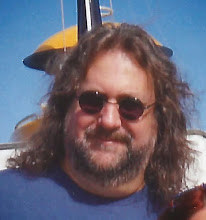We start with The Haunted Tank in "The Iron Horseman" by Robert Kanigher and Russ Heath. Pop Peters is an old war veteran. He tried to fight in the first World War, but he was declared to be too young. When he came of age, he re-enlisted, but the war was over. Now he is too old to fight in the second World War, so he works as a tank mechanic and tells the orphans at a convent war stories that stretch the truth.
After Pop makes repairs to the Haunted Tank, it returns to action. Following a skirmish with the Germans, Jeb learns that a group of Nazi tanks is headed for the convent. The Haunted Tank comes to the rescue, but it is set on fire by a Nazi flame-thrower. While the crew takes cover, Pop mans the machine gun and stops the Nazis. He is injured in the fight and must receive a blood transfusion from one of the nuns to save his life.
Heath seems to have really rushed this one. Maybe sleeping at the Playboy Mansion was starting to take its toll. This story was reprinted in Showcase Presents: Haunted Tank Vol. 2 TPB.
The is followed by a two-page Battle Album featuring the "General Stuart Light Tank M3A1" by Joe Kubert.
Next is "Taps for a Bugler-Boy!" by Robert Kanigher and Fred Ray. A grandfather reminisces with his grandson about when he was a bugle boy for General Washington during the Revolutionary War, of crossing the Delaware with Washington and the attack on Trenton. When his grandfather passes, the young boy keeps his bugle and a year later, as the Civil War starts, the boy joins the Confederacy as a bugler.
When his Colonel is shot, he plays taps at his funeral and it then told to not play the bugle again, as it lets the Union soldiers know their position. Though he keeps his bugle, the boy stops playing it, till one day in the heat of battle he is wounded. In desperation he reaches his fallen bugle and begins to play, invigorating the soldiers. A Captain picks the boy up onto his horse and they ride into battle as the boy blows his bugle. When the battle is over the boy once again plays taps for the dead, before he too, succumbs to his wounds.
We end with a one-page gag by Pete Costanza, entitled "Army Time -- Now and Then."
Edited by Joe Kubert.







No comments:
Post a Comment